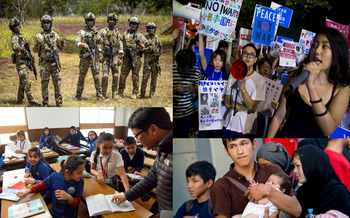Kikunohana Initiative
 Clockwise from top left: Soldiers of of the Maritime Raiding Group (MRG) pose with Ajij Kogoya and Dimas Gunawan (pictured left), the first ethnically Sundanese members of the special forces group; Student-led group protests in Nakazara in response to the re-introduction of national service for males; Newly-admitted immigrants from West Meridia await transportation to subsidised housing; Children of Sundanese and Quamponese immigrants attend classes to learn the Dayashinese language | |
| Location | Dayashina |
|---|---|
| Type | Social reform, military reform |
| Cause | Pan-Septentrion War II, 2022 Dayashinese Snap Election |
| Organized by | Prime Minister Daichi Noru, Minister of Defence Ryutaro Kiyosaki, other members of the Dayashinese Conservative Party |
| Outcome | Re-introduction of national service, expansion of military size and spending, loosening of immigration and refugee policies, expansion of national cultural and lingual integration programmes |
The Kikunohana Initiative is a series of social and military reforms enacted by the Dayashinese Conservative Party under Prime Minister Daichi Noru following the 2022 Dayashinese Snap Election. The Kikunohana Initiative is considered one of the major parts of Dayashina's response to the Second Pan-Septentrion War and a result of a wave of support for the Conservative Party during the snap election of 2022. It refers to a number of social and military reforms that were voted through in rapid succession in 2022 with three objectives in mind: putting an end to a hubris and complacency in defence which Dayashina could no longer afford, liberalising Dayashina's immigration and refugee policies to make them more fair, and reducing the barriers to opportunity for foreigners to permanently live, work, or serve in Dayashina.
Most of the policies enacted were around the dismantling of discriminatory barriers, standing for decades, which barred untold quantities of people from legally obtaining permanent residence or citizenship in Dayashina. A comprehensive list of expansions for opportunities for foreigners to live and work in Dayashina was published across government media, and the changes rapidly took effect in the Dayashinese Ministry of Foreign Affairs and Office of Immigration Services. Among the most prominent of changes was that many must no longer prove Dayashinese ancestry to obtain citizenship in the country, rather than remaining a permanent resident or constantly renewing a work living permit. A right previously only afforded to ethnic Meng and A'olafans, the right was been expanded to encompass all ethnicities within the Dayashinese Association, the Organisation of Southern States, Themiclesia, Mittelcasa, and select West Meridian nations. Leaning further into this sentiment, the Dayashinese government allocated billions in funding to expand cultural and lingual integration programmes, meant to assist foreigners in integrating and assimilating to the norms of the country, alongside connecting immigrants, refugees, and foreign workers to the financial and professional assistance they often need. Lastly, the Dayashinese government made it officially illegal for businesses to impose limitations on working hours for foreigners, and for landlords to maintain discriminatory no-foreigner policies.
Other policies enacted in the Kikunohana Initiative focused on the military. Most notably was the outright rejection of the 2019 Defence Reforms forced by the Dayashinese Liberal Party, which mandated that the government spend less than 3% of the GDP on the Republic of Dayashina Defence Forces by 2025, in favour of a spending expansion plan which saw the new defence spending target reach 4% of the GDP, over $200 billion standard dollars. This spending increase is largely meant to help accomodate for expansion plans across all major branches of the RDDF, including a planned total servicemember expansion to 550,000-650,000 alongside the procurement of much more new equipment to arm future formations. This expansion in personnel count is to be made possible by the highly controversial re-introduction of national service, which removed recruitment quotas and limitations placed on the military and allowed them to begin selecting male citizens and residents of Dayashina (between the ages of 18 and 27) for a mandatory two-year service period. Moreover, policies enacted under the Kikunohana Initiative removed barriers to entry for for males of foreign descent to enter the RDDF, making of-age immigrants eligible for voluntary service and/or selection for conscription. Permanent residents who serve in the military are granted citizenship immediately upon finishing two years in service of the RDDF.
The Kikunohana Initiative was met with a great variety of responses from the population of Dayashina, with protests and counter-protests rising across the nation.